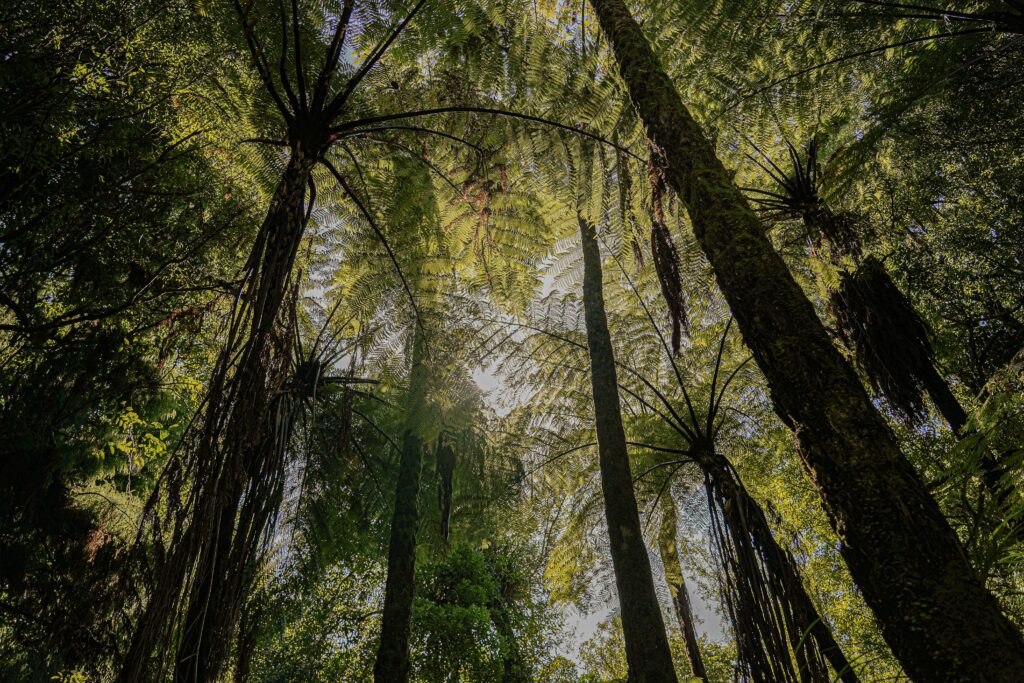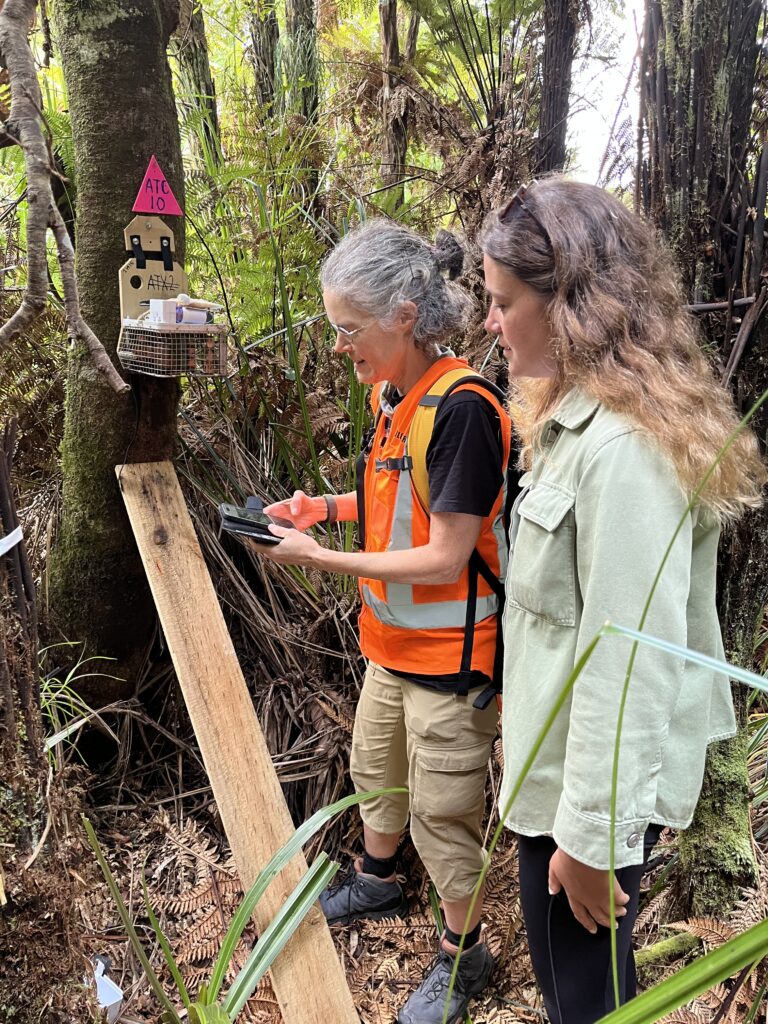Latest News
Gemma Coate from Sustainable Business Network shares her insights on Priority One’s Partnering for Nature programme, which connects businesses to meaningful local nature projects.

A powerful initiative in the Bay of Plenty is connecting businesses with local nature regeneration projects. It is also raising awareness about Aotearoa New Zealand’s biodiversity crisis.
Partnering for Nature is a collaboration by Priority One, Bay Conservation Alliance, Manaaki Kaimai Mamaku Trust and Bay of Plenty Regional Council. I had the privilege of supporting their work during
a recent visit to the region.
Launched in mid-2024, Partnering for Nature is grounded in a simple but vital truth; all businesses depend on nature. From the food we eat and the freshwater we drink, to our wellbeing and climate regulation, the ecosystem services provided by nature are fundamental to thriving communities and economies. Yet, many businesses have not fully recognised their interconnection with the natural world.
Insights from SBN’s 2023 research Regenerating Nature: The Transformative Role of Business highlighted key barriers to businesses taking nature action:
- 68% cited the economic climate as a barrier to investing in nature-related initiatives
- 38% believed that nature was not relevant to their business
- 36% said time constraints limited their ability to take action
These insights led directly to the creation of Partnering for Nature, an initiative designed to break down the barriers to business investment in nature born from a collaboration between Bay Conservation Alliance, Bay of Plenty Regional Council, Manaaki Kaimai Mamaku Trust and Priority One. As the economic development agency for the Western Bay of Plenty, Priority One is committed to growing a sustainable economy that supports local people and communities. The alignment between Priority One’s sustainability strategy and the goals of Partnering for Nature created a natural fit for collaboration.
“Conserving biodiversity isn’t just about ensuring that future generations get to see taonga species in
the wild, or that we maintain ecosystems that support our community well-being – especially in times
of difficulty; it’s also critical for a thriving economy.”
– Bay Conservation Alliance
“Ka ora te whenua ki te Kaimai Mamaku; ka ora te tangata | The Kaimai Mamaku thrives; hence we thrive.”
– Manaaki Kaimai Mamaku Trust
Together, Bay Conservation Alliance and Manaaki Kaimai Mamaku Trust support forty-five nature-based community projects across the region. These projects offer a powerful opportunity for local businesses
to collaborate and make tangible contributions to support local environmental outcomes.
To kick off the initiative, Partnering for Nature began by assessing the current level of business awareness, interest in biodiversity and nature initiatives, and identifying practical opportunities for impactful partnerships.
The initiative launched officially in Tauranga with a business breakfast event in November 2024. The Sustainable Business Network (SBN) presented national trends and barriers to nature-positive business practices. Businesses, such as Zespri International, Ballance Agri-Nutrients and Rayonier Matariki Forests, shared more about their involvement and investment in local nature projects, outlining challenges and positive outcomes. The event also served as a platform to gather valuable feedback on how local businesses perceived the role of nature in their work.
Survey results from attendees reflected strong alignment with SBN’s national findings:
- 93% of businesses said they needed to demonstrate environmental responsibility to customers,
staff, supply chains, and shareholders - Only 23% were already investing in biodiversity initiatives
- Restoration of native habitats, like waterway restoration, was ranked as the most aligned nature-positive activity
- Measurement, monitoring and reporting standards were seen as key to increasing confidence
in investing in nature
The second event in the series featured Louise Saunders (Manaaki Kaimai Mamaku Trust) and Michelle Elborn (Bay Conservation Alliance). They provided insights into why businesses should care about and contribute to a nature-positive economy. Workshop activities then encouraged attendees to think about why they cared about nature action, what was stopping them from doing more, and what kind of information they needed to convince decision makers in their business to support nature action.
Above: Partnering for Nature Volunteer Day with Priority One, Bay Conservation Alliance and Kale Print
A rise in nature-focused volunteer days is one of the outcomes from Partnering for Nature. For example, the team from Priority One and Kale Print joined a corporate conservation day at Oteora which was themed to support learning and contributing to Aotearoa’s Predator Free 2050 ambition.
“We brought six of our staff out here as part of a conservation work programme. It’s great to see this work going on. As a business, we want to do more for our community, and we encourage everyone to get involved.”
– Peter Lloyd, Kale Print General Manager

Gemma visiting trap lines near the Pā Kererū loop walk.
During my visit, I also met some of the incredible community groups based in the Bay of Plenty that are doing the mahi on the ground:
- Friends of the Blade, led by Alison McCulloch and team, maintains trap lines across 250 hectares near the Pā Kererū loop walk. The deployment of self-resetting Autotraps (AT220) has been a game-changer. Recently, the group celebrated a significant milestone – long-tailed bats (pekapeka) were detected near their wetland restoration site.
- Aongatete Forest Project, active since 2001, manages 500 hectares of native bush within the Kaimai Mamaku Conservation Park. Thanks to tireless volunteer efforts, titipounamu (rifleman) have returned and numbers are now rising.
- Te Maire 2021, an iwi-led group working across 1,000 hectares beside Aongatete Forest Project, is restoring the mauri of the forest by targeting pest animals. Last year, the team deployed its first toxin operation. Rat density declined from 42% to just 2% and possums declined from 28% to 11%.
- Project Parore, founded in 2004, is focused on landscape-scale nature restoration from the foothills of the Kaimai Ranges to the northern Tauranga harbour across eight catchments – approximately 16,000 hectares of land which is not covered by formal conservation protection.
Partnering for Nature is already demonstrating the power of collaboration. By bringing together businesses, councils, the local economic development agency, community groups and ecology experts, the initiative is creating a blueprint for nature regeneration – one that could be replicated across Aotearoa New Zealand to break down the barriers for businesses to invest in nature.
Next up in the learning series:
- Tauranga Green Drinks
Thursday 1 May, 5:30pm
The Partnering for Nature initiative will be shared with the wider community, inviting support from across the region. - Nature Connect workshop – June 2025
To provide businesses with information about the variety of projects currently under way in the Bay of Plenty region, the impacts they are achieving and the investment they need to continue delivering that impact. Details to come from Priority One.
For more information or to get involved, please contact Marrisa Nikora, Sustainability Lead marissa@priorityone.co.nz
Sign up to the Priority One newsletter here: http://eepurl.com/gY85ID
